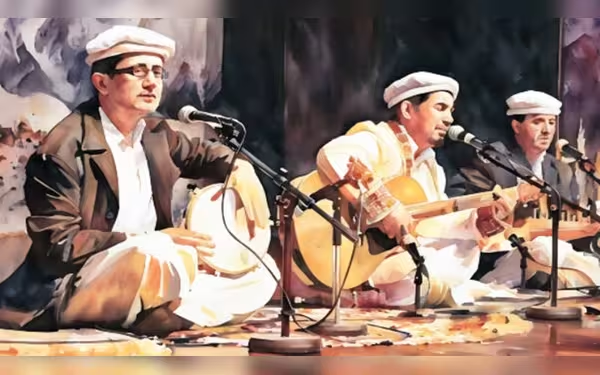Thursday, November 7, 2024 08:55 AM
The Cultural Significance of Music in Pakistan
- Music connects generations and evokes deep emotions.
- Debates arise over music's role in religious contexts.
- Folk artists aim to reclaim their place in the industry.
 Image Credits: thefridaytimes
Image Credits: thefridaytimesExplore the cultural significance of music in Pakistan, its emotional impact, and the ongoing debates surrounding its role in society.
Music has always been a powerful force in human emotions, capable of evoking feelings and memories that words alone cannot express. For many, including those in Pakistan, music is not just a form of entertainment; it is a deep-rooted cultural expression that connects generations. From the soothing melodies of folk songs to the vibrant beats of contemporary music, the journey of music in Pakistan is rich and diverse.
Growing up, many individuals find themselves enchanted by the sounds that fill their homes. For instance, the early morning rituals of listening to FM radio stations like Sachal FM105 or Indus Music can create lasting memories. These experiences often shape one’s understanding of music and its significance in life. The emotional connection to songs, such as "Rangeelo Maro Dholna," can bring about goosebumps, illustrating how music can touch the soul.
However, the relationship between music and religion in Pakistan can be complex. Some individuals question why music, which brings joy and inspiration, is sometimes labeled as "haram" or forbidden. This contradiction raises important discussions about cultural interpretations of religious texts. While some argue that music is inappropriate in certain social settings, others believe that traditional forms of music, like the soulful renditions of Alan Faqeer, should be celebrated rather than condemned.
As society evolves, so does the music that resonates with its people. The rise of genres like house music has sparked debates about the authenticity and depth of contemporary sounds compared to traditional folk music. While house music may provide a temporary thrill, it often lacks the emotional and spiritual connection found in the ragas and folk tunes that have been cherished for centuries.
Political and social themes in music also play a crucial role in shaping cultural narratives. Artists like Shabjdeed and Faris Shafi use their platforms to address important issues, reminding listeners of the power of music as a tool for change. Bob Marley’s legacy, particularly his One Love Peace Concert, serves as a historical example of how music can unite people and promote peace amidst conflict.
In Pakistan, the hope remains that folk artists will reclaim their rightful place in the music industry, bringing traditional sounds to the forefront. The words of poets like Bulleh Shah and Waris Shah continue to inspire, reminding us that music is not merely a commodity but a profound expression of human experience. It is a medium through which we can connect with our roots and with each other.
Ultimately, music is a treasure that belongs to everyone. It transcends boundaries and speaks to the heart, offering a glimpse into the soul of a culture. As we navigate the complexities of modern life, let us cherish the melodies that connect us to our past and inspire us for the future. Music is not just an art form; it is a vital part of our identity and a reflection of our shared humanity.












